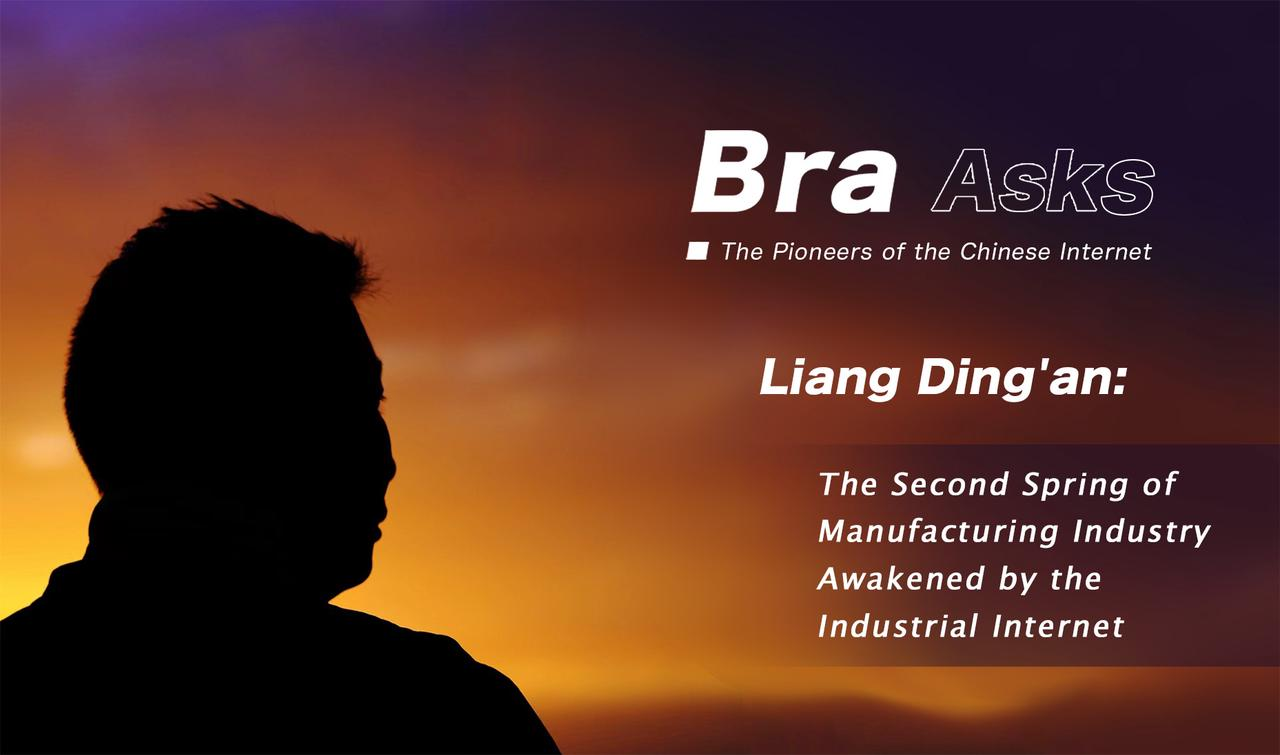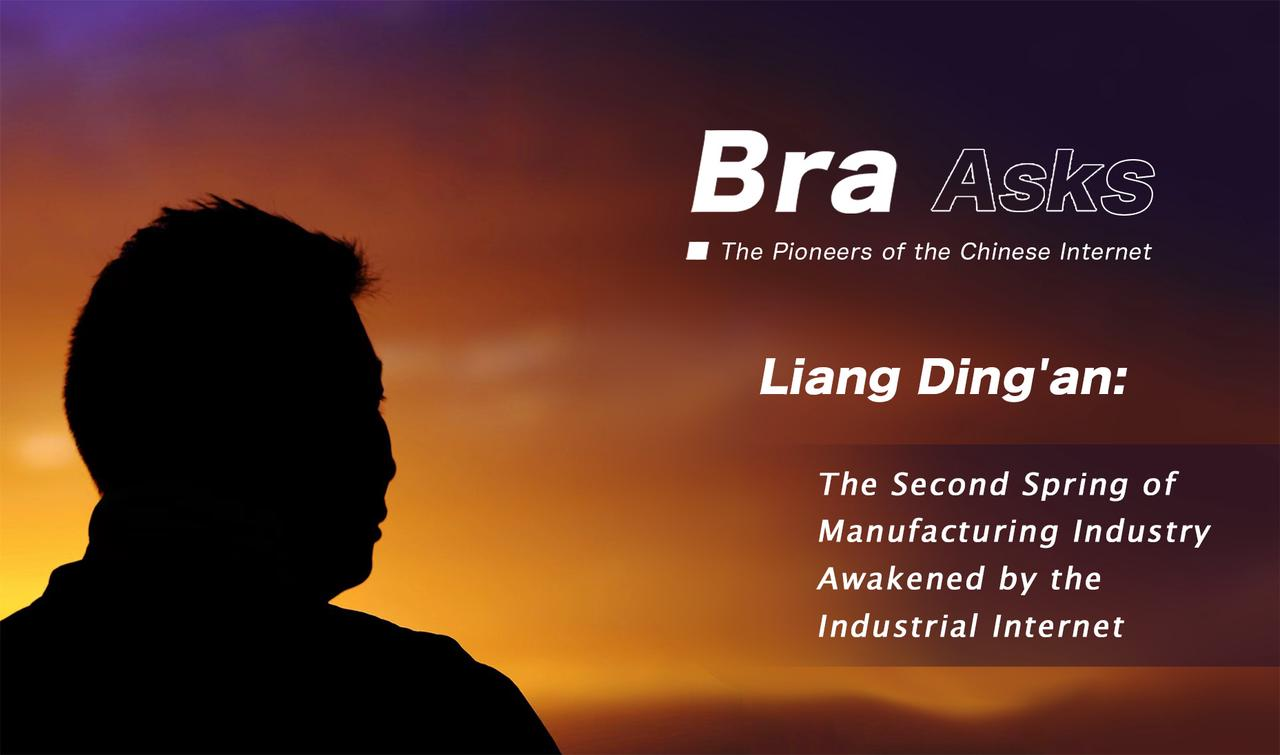Bra Asks Liang Ding'an: The Second Spring of Manufacturing Industry Awakened by the Industrial Internet

Guest: Liang Ding'an
General Manager of Intelligent Manufacturing at Tencent Cloud. He is primarily responsible for the development of solutions and products related to enterprise digital transformation, intelligent manufacturing, and the industrial internet. He has previously served as the Technical Director and Product Director of the Tencent PCG, a technical operations expert at Tencent, and a core technical operations standard expert at the CAICT (China Academy of Information and Communications Technology).
Hosted by Sam Ng (aka: Bra)
Founder of ServBay, Secken and DNSPod, former General Manager of the SME Product Center at Tencent Cloud, cybersecurity expert, domain and DNS technology expert, webmaster, China Europe International Business School (CEIBS) EMBA.

Bra:
From what I understand, you were previously in charge of the operations and development team for Tencent's social platforms, with 10 years of experience in operations development, massive operations, and architectural planning. You were primarily responsible for the operations development and operations planning of social platform services like Qzone, Photo Albums, and Music, specializing in the architectural design and automated maintenance of mass services. Previously, your focus was more on To C services, which are comparatively lighter compared to your current focus on intelligent manufacturing. How do you think your past experiences have helped you in your current role?
Liang Ding'an:
The two types of businesses are worlds apart. Traditional internet companies rely on IT technology innovations to lead their entire business model forward. This is especially true for consumer internet companies, which is easier to understand. For example, consumer internet companies rarely have sales departments; they focus on creating good products that speak for themselves. In contrast, traditional industries, whether they are To B or To C, have sales, channels, and their own operational models.Transitioning from internet technology to the industrial field, we find ourselves relatively distant from the industry applications needed by our customers. Especially in manufacturing, where profits are generated through the production of products, the tools relied upon are not servers or programs like in the internet industry, but rather machines like lathes and die casting machines, among others. These production devices may include some software but are more often specialized production control systems for the industrial sector. For Tencent and myself, understanding customer application scenarios, providing appropriate solutions based on these scenarios, and serving industrial customers through research, production, supply, sales, and service—this end-to-end lifecycle presents a significant challenge.In terms of business selection, we have shifted from areas we are most skilled in to those we are least familiar with. Initially, we focused on general internet customers, such as gaming, short videos, and live streaming, which are also Tencent's areas of expertise. Therefore, providing solutions for them and engaging in dialogue was easier. Another group of our customers includes government and financial services. For example, our government customers ultimately serve citizens and the public. This plays to Tencent's natural advantage in connecting people, as seen in our Digital Guangdong project, which leverages Tencent WeChat's ability to connect massive numbers of users with government services online and on mobile devices. Compared to traditional service methods, the integrated service model we offer can provide more effective and convenient services for citizens, naturally earning their approval. By leveraging technological innovations to reduce costs and increase efficiency, the financial industry benefits in the same way. Previously, applying for a loan at a bank might require submitting a lot of paperwork offline, but now it can be entirely resolved online. The financial industry can directly feel the business empowerment brought by cloud and technology.The industrial sector is part of traditional industries and encompasses many sub-industries. We approach these industries, some with over a century of heritage, with respect. We do not expect to break through their technological barriers overnight or grasp the core of their business within a year or two. Therefore, we clearly position ourselves, seeking breakthrough points in these sub-industries, such as information systems, to truly delve deep into what the industry needs and empower it.
Bra:
With the national push for enterprise digital transformation, what kind of enterprises do you think need digitalization, or is it necessary for enterprises to digitalize? In the process of enterprise digitalization, how does Tencent empower enterprises?
Liang Ding'an:
In recent years, the country has advocated for enterprise digital transformation. But why digital transformation? In my view, there's a logical thread behind it. Digital transformation aims to interconnect the data from the production and operation processes of various industries with the upstream and downstream of the industry, ultimately discovering new business models, reducing costs, increasing efficiency, and enhancing the competitive edge of enterprises in their vertical domains.In the process of enterprise digitalization, despite the diverse attributes of our client industries, there are commonalities. Among these commonalities, the most basic is whether the client's existing systems can be integrated into the cloud, which is the most fundamental collaboration point between us and the enterprises.Looking back, manufacturing enterprises are large, and even if their IT scale is limited, they can still be empowered by the cloud. However, for large enterprises with substantial capital and mature infrastructure, they have the capability and financial resources to maintain their infrastructure. So why should they move to the cloud? When their pain point is not whether to move to the cloud but how to enhance their business growth ability and competitiveness, our collaboration moves to the next step. Beyond basic cloud services, we provide C2B capabilities for enterprises. C2B is a broad concept, extending to C2B2B and then to 2C. Through digital means, we break down data silos and achieve information integration across the industrial chain, enabling enterprises to better understand the application scenarios, needs, and motivations of their end-users. Only by better planning products, channels, and distribution systems, and serving users well along the industrial chain, can we truly enhance product competitiveness.
Bra:
Pony Ma(Founder of Tecenct) once proposed the development strategy of "Tencent will root in the consumer internet and embrace the industrial internet." How do you understand this strategy? The industrial internet and the industrial internet overlap to some extent. As a representative of the consumer internet, what role does the industrial internet play in Tencent's comprehensive embrace of the industrial internet?
Liang Ding'an:
This is a visionary strategy. In fact, you'll find that before Pony proposed the industrial internet, the term wasn't much used in the industry. The earliest term was "Internet+" in 2015, which, along with the industrial internet, was proposed by Pony at the National People's Congress. The term stems from our years of deep cultivation in the internet industry. For example, "Cloud, Big Data, Mobile Internet, IoT, AI" where "Cloud" refers to cloud computing, "Big" to big data, "Mobile" to mobile internet, "IoT" to the Internet of Things, and "AI" to artificial intelligence.Because traditional enterprises are relatively weak in technologies such as mobile office, many large enterprises with significant turnover still use very traditional paper-based office modes. The reason internet companies are agile is precisely because of the efficiency of IT. Tencent has mentioned that demands raised by Pony at night could be released the next afternoon. In contrast, the deep-seated reason behind the traditional enterprise's meetings, approvals, and visas is the lack of IT infrastructure and facilities to support digital transformation.By proposing the industrial internet, we aim not only to solve specific problems but to address the issue head-on. Our tactical diligence merely covers up strategic laziness. We hope that entrepreneurs and decision-makers across industries can step back and look at today's Chinese manufacturing. We are fortunate to cooperate with enterprises under the banner of the industrial internet, serving enterprises with the capabilities of the industrial internet.
Bra:
At last year's Tencent Global Digital Ecosystem Conference, Tencent Cloud Intelligent Manufacturing unveiled three major strategic layouts for the first time, along with the launch of the "511" ecosystem plan. In the future, it will focus on the five major links of industrial manufacturing research, production, supply, sales, and service, joining hands with 100 partners to create 1000 industry solutions. How is Tencent Cloud Intelligent Manufacturing progressing so far? What new actions can be expected in 2021?
Liang Ding'an:
Tencent is clear about its areas of expertise, hence the "511" ecosystem plan, aiming to play the role of an assistant. As Pony said in 2010, we should entrust half of our lives to our partners, a principle we have been practicing until today.The digital transformation of enterprises certainly requires computing power. Storage networks collect data through the network for computation and storage utilization. Tencent provides the engine from the IP perspective to identify and solve problems.In 2021, we will steadfastly implement this strategy, which is also closely related to Tencent's corporate culture. We welcome and look forward to integrating with ecosystem partners and are especially willing to share our years of experience in the consumer internet, such as our technical advantages, understanding of data, and comprehension of AI algorithms, among others.
Bra:
Since Tencent Cloud started developing intelligent manufacturing, several public cases have focused on large enterprises like Sany Heavy Industry. What is the focus of Tencent Cloud Intelligent Manufacturing development? How do you consider empowering the intelligent manufacturing transformation of small and medium enterprises?
Liang Ding'an:
Yes, this is a core topic that the Chinese industrial internet needs Tencent to address. Compared to large enterprises with strong capital that can find various suppliers to solve their problems, many small enterprises simply cannot access the latest information or find suitable solutions. Looking at some developments abroad, cloud-based SaaS services are quite popular, but back in China, this area is still at a very preliminary stage.Let me give you an example. We have implemented Tencent's industrial internet platform in Zhangjiagang(A city of Jiangsu Province, China), introducing ecosystem partners based on this platform. We have been visiting local enterprises one by one to understand their operational and production issues. Then, we match these issues with solutions from our suppliers and solution library to introduce the most suitable solutions. So far, I have conducted over thirty visits and surveys. Different regions have different business models; some regions have lower automation levels and find it difficult to implement large-scale model changes. We recommend mobile office solutions, which are very popular. However, solutions suitable for Foxconn may not be cost-effective for them. At this point, Tencent has many ecosystem partners, such as Weimob, WeCom Manager, and DaoYi, who can provide solutions.
Bra:
If two leading enterprises with strong competitive relationships in the industry choose Tencent at the same time, will there be concerns?
Liang Ding'an:
First of all, Tencent is not their competitor; we are a sufficiently neutral third party. We mainly help them improve their business efficiency, streamline costs between industries, and improve communication.
Bra:
As a major trend in the transformation and upgrade of the world's manufacturing industry, intelligent manufacturing, which deeply integrates digitalization and industrialization, has become the main direction of attack. Against this development background, major internet giants have also entered the intelligent manufacturing arena. With the giants leading the way, what kind of development will China's and even the global manufacturing industry face?
Liang Ding'an:
In the industrial internet arena, there are several core players. The first category includes traditional companies, such as Siemens, which have always been in this field. They produce equipment and naturally develop IoT solutions based on their equipment. The second category includes software service providers, such as Aerospace Cloud Network and Inspur. The third category includes Tencent, Alibaba, Huawei, and others, which originated from the internet. These three types of players each bring their unique strengths to intelligent manufacturing, each with its own merits.
Bra:
Speaking of the rivalry among giants in intelligent manufacturing, what is Tencent's competitive edge? What role does the Tencent Intelligent Manufacturing team play in combining Tencent with the industry?
Liang Ding'an:
Tencent's core strength is our C2B capability, which allows us to better understand and connect with users, providing smart solutions in the process. Another advantage is our understanding of big data and the application of AI capabilities.When Pony proposed the industrial internet, he clarified Tencent's position in the industrial internet, namely as an assistant for enterprise digital transformation. We provide "Cloud, Big Data, IoT, Mobile, AI" technology tools and ecosystem capabilities to help enterprises upgrade their digital transformation. Tencent has strong technological capabilities, which were either previously confined to laboratories or the consumer internet. Finding scenarios to implement these capabilities in the industrial field is the role our intelligent manufacturing team plays. Therefore, our team includes people who understand Tencent, internet technology, industry technology, and business logic, helping more enterprises clear obstacles on the path to digital transformation.
Bra:
With the widespread application of AI in the industry, AI not only significantly increases work efficiency but also greatly reduces manpower. What are your thoughts on factory hollowing out due to young people's changing job requirements? As intelligent manufacturing develops to a certain extent, the supply relationship will inevitably change. What suggestions do you have for this structural transformation?
Liang Ding'an:
With societal changes, we often encounter topics like machine replacement of human labor in intelligent manufacturing discussions. However, our research in enterprises shows that this is not the case.The reason for machine replacement is that people simply do not want to work in factories. Nowadays, people think that delivering food, becoming internet celebrities, or couriers can earn a lot and have controllable time. So, when we visit enterprises, the reality we see is many idle devices. I asked the boss if it was because there were no orders and they hadn't started production. He said it was because they couldn't recruit people. The pandemic has exacerbated this problem. Many enterprises have the conditions to resume work and production, but no one is coming back to work, which is a significant issue they face.Intelligent manufacturing cannot take large steps at once; it must progress gradually. Looking at foreign examples, there will definitely be fewer people engaged in such work, such as fully automated and mechanized agriculture abroad. People are becoming increasingly valuable because they are the most flexible production tools and workforce. We need to utilize people where they are most needed.I think we have demonstrated that intelligent manufacturing brings efficiency improvements to manufacturing enterprises or society, rather than overly magnifying the impact on people. Regardless of whether intelligent manufacturing exists, people will naturally move in this direction. This is also an inevitable trend.
Bra:
The industrial internet, through the connection of intelligent machines and the integration of human-machine connections, along with software and big data analysis, restructures the global industry, stimulates productivity, and makes the world better, faster, safer, cleaner, and more economical.Can you introduce the advantages of industrial all-in-one machines in practical operations?
Liang Ding'an:
Why design an all-in-one machine product? It is specifically tailored to the inherent scenarios of manufacturing enterprises. For both the IT and OT domains across groups and factories, why do we promote all-in-one machines? Firstly, it's to lower the threshold for enterprises to move to the cloud, reduce costs, and offer a flexible model such as outright purchase or leasing, also addressing certain scales of computing power and storage capacity services. It also helps us implement specific scenarios for data desensitization and processing, etc. If allowed, it can immediately form a hybrid cloud, with large private clouds and public clouds forming a cloud. It offers a more flexible technical architecture to help enterprises phase in the construction of their digital base, which I believe is the core value of the all-in-one machine.
Bra Interviews Liang Ding'an: The Second Spring of Manufacturing Industry Awakened by the Industrial Internet
Thanks for reading
If you are interested in more information, follow Bra's X(Twitter)

